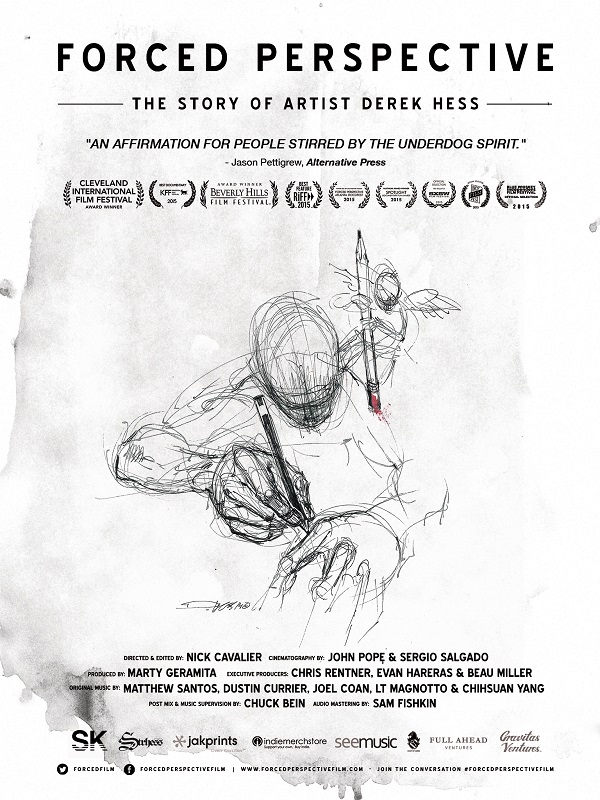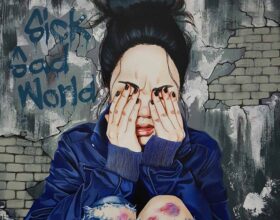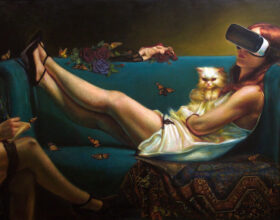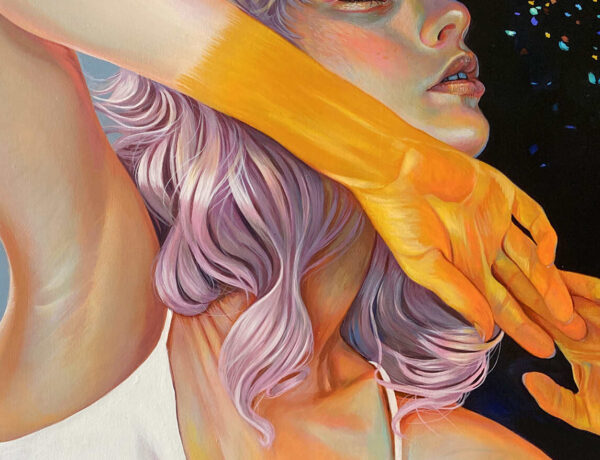 Superhero + Modern Master = Derek Hess
Superhero + Modern Master = Derek Hess
Last year, Forced Perspective swept through film festivals, gaining a large amount of recognition. The piece won several awards. Directed by Nick Cavalier as his debut documentary, the movie relates the art and life of Derek Hess, and is currently being shown at Copro Gallery as part of his current solo show, ‘I Told You Not to Call the Police’. Based in the US in Cleveland, Ohio, Derek is largely responsible for creating the underground Cleveland music scene with his well-known music poster art and Euclid Tavern concerts. Early on, Derek was influenced by comic books and the technique artists used in them called forced perspective. He has been a Cleveland legend for over fifteen years, growing up on his art. Derek Hess is famous for his dark, emotive mixed media drawings that help people express and realize their pain and heartbreak. Derek creates fundamentally sound work that describes feelings we all have experienced at one time or another. Although already considered a hero among his fans, Hess won a Local Heroes award, officially deeming him a superhero.
Forced Perspective was beautifully put together by Nick Cavalier, a former Clevelander. Nick, like so many, found Derek’s art guided him through his darker days. The film brings you closer to Derek Hess and his process. During the film, you learn about his artistic evolution, struggle with alcoholism, and his philosophy on art. All the while witnessing Rommel the dog’s role of studio helper. After seeing the documentary, I felt a stronger understanding of his work, and a deeper connection to artwork that I have admired since childhood. The film also touches on the topic of mental illness, as both Nick and Derek have Bipolar Disorder. This not only added another level of social relevance to the documentary, for me it also made this artist I have admired most of my life more human… a real life person with real life problems. Forced Perspective makes Derek Hess more relatable, though to me and to a multitude of others, he will always be a superhero.
Nick Cavalier and Derek Hess generously gave me some of their time to answer a few questions about Bipolar Disorder and their film Forced Perspective.
Directed & Edited By: Nick Cavalier
Produced By: Martin Geramita
Executive Producers: Chris Rentner, Evan Hareras & Beau Miller
Cinematography By: John Pope & Sergio Salgado
Titles And Color By: Coat Of Arms
Location Sound Mix By: Ben Stockton
Post Sound Mix By: Chuck Bein
Original Music By: Matthew Santos, Chihsuan Yang, Joel Coan, Dustin Currier & LT Magnotto
Additional Music By: The Felix Culpa, Thereafter, Chris Zabriskie
Forced Perspective has won multiple awards, including Best Cinematography (Beverly Hills Film Festival), Best Documentary (Kingston Film Festival), Best Feature (RIFF), Local Heroes (CIFF), and Excellence in title design (SXSW).
Preorder Forced Perspective by May 27th, also available through Google Play, Vimeo, and iTunes. The current showing at Copro Gallery is available to see in person until Saturday 28th May, 2016.
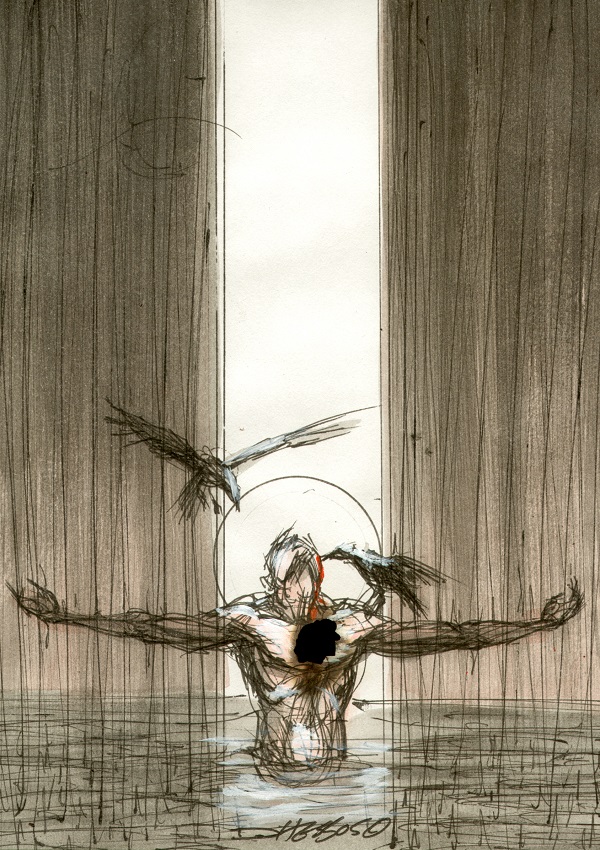
How did the idea for this documentary come about? The film has a strong focus on mental illness, related to Derek’s struggle with Bipolar Disorder. Was mental illness awareness a catalyst for creating Forced Perspective?
Nick: Not at all actually. I was just a Derek Hess fan, and wanted to make a film about his relationship to his art. A portrait of a modern master. However, being that most of his images are morose and dark subject matter, I had a good inclination that there was more to his story to explore in a much deeper, more profound way. As you know, I have my own struggles with mental health so finding a way to illustrate what it’s like to deal with the conditions I have and working with Derek was a great way of doing this. I also wanted to show how difficult it is for people suffering from mental health issues to get help. For example, Christian residential treatment centers are very hard to find so people of faith can find it nearly impossible to find a treatment clinic that will heal them using their beliefs. I wanted to show how hard it was for people to even reach out to people for help and then being unable to find the right place for them when they do.
Derek: Well, Nick contacted me. I didn’t know him, and he pitched it at me, so I met with him. He seemed like a nice guy, I looked at his website, and was like sure, if someone wants to film a movie on me, ya know, why not. How often does someone want to do a movie on somebody? So I’m like sure. As far as mental illness goes, that’s just part of the story. It’s not like we were planning to explore that, we weren’t like “Let’s try to shine a light on this” or whatever. I just blurted it out, and it somewhat just went from there. We didn’t have an outline of how the movie was going to go. We just started filming, and Nick goes “Let’s talk”, so we talked. In the beginning I say “We all have different paths to the same destination.”. Bipolar is part of my history, those people may be or may not be. So that’s how Bipolar Disorder came up. It was an unplanned thing. I’ve actually gotten attention from mental health Boards. It’s a point of interest, it’s more than I thought it would be. I’m Bipolar 2, I live with it, I don’t see it as being that big of a deal. I guess many people don’t talk about it. I’m so used to talking about it to friends and the doctors and my therapist and all that crap, that it just seems like second nature. It’s like I’m a diabetic. The parallel to that is people talk about the meds, ya know because I’m on meds, and I am a big supporter of that. Whereas some people aren’t. Some people take their meds, feel better, and then go off them. Then they get crazy, ya know? With the meds – this is where the diabetic thing comes in, [it’s like] insulin to a diabetic, you’ve got to take it every day- it’s a chronic issue, you’re treating it but you can’t cure it. So yeah, I don’t know how I got on that [topic of meds], but that’s how I feel [laughs]. Mental health…people are focusing on that a lot, which I think is cool. That kind of surprised me.
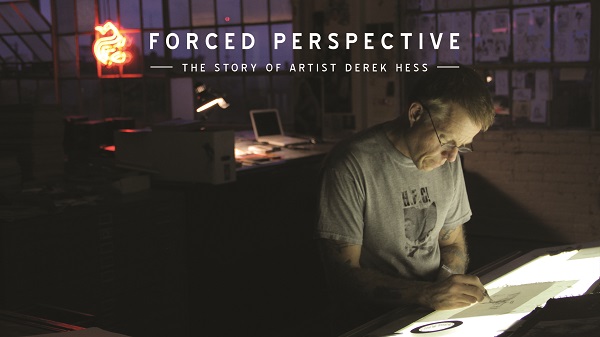
What scene from the film was most successful in your eyes and why?
Nick: The intro to me is very special. It sets the tone of the whole film and gives insight into what “Forced Perspective” means on a subversive level. Derek Says: “What gets me to there is my story.” So, it foreshadows that there is more to his story. Really happy about that. One of my favorite moments in the film is when Derek is telling the story about trying to kill himself in Switzerland and Rommel [Derek’s dog] is comforting him. Shortly thereafter, as he talks about the urge to throw himself in front of a bus, the bus goes by on Superior Avenue [Derek’s studio]. You can’t plan something like that if you tried.
Derek: I always liked the scenes with my dog. I thought those were the best parts. I liked talking about the comic book art; we didn’t do enough of that. There’s more of that in the outtakes. I like that; I enjoy discussing other artists that I admire. When we got into the alcoholism and the alcohol, I didn’t like that. But that’s part of it and had to be in it, ya know? I watch the film, I reminisce on it, and I kind of cringe. The alcoholism stuff bothers me, but it’s part of the story. We didn’t dwell on it too much. I do like that it came out of the blue, since we weren’t filming based on a story line, it was straight through. We got to it. When I started drinking was when I went overseas. [The film] wasn’t really clear when I started. I was feeling suicidal, and when I made the choice not to step in front of a bus, I made the choice to go start drinking. So that’s when I fell off the wagon. I had sixteen years [sober] up to that point. Then I came home, people knew me in town for being sober, no booze, no drugs. I wasn’t straight edge, it just wasn’t part of my lifestyle. Only a handful of people knew me from before in the 80’s, I was a major problem in the 80’s. We barely touched on that. So I had to hide my drinking, I was closet drinking, and you can only do that for so long.
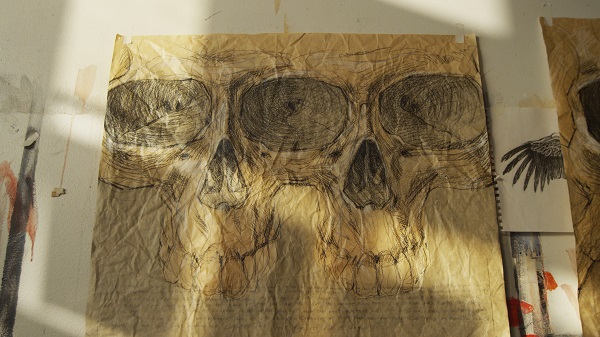
You both have Bipolar Disorder. What advice would you give to those afflicted with mental illness and/or addiction?
Nick: I can’t speak for Derek, but for myself, turning my manic energy into the arts was always cathartic to me. Instead of pushing that energy outward into something that could damage your life, channel it into something that makes a real difference in the world. Make your weakness a superpower. Addiction is hard to tackle alone, and with there being plenty of services and facilities out there to help – outpatient alcohol rehab dallas could be one such solution for addicts to turn to – fighting it alone doesn’t have to be your go-to answer.
Derek: I touched on it with the meds. If you have a mental illness, you need to address it. It’s not something that’s just going to go away. You need to see a doctor, and you need to be assessed on whether you need to be on meds. If you’re diagnosed and they want you to be on meds, then you should take them. A lot of people are like “well they make me feel funny”, or don’t take them, they go “I feel great” and the don’t take them anymore. Honestly, that’s the worst. If you go on and off, on and off, it really screws up your chemical balance. I think that you should take care of yourself. You have to be responsible for your own health, that’s as big a health issue as diabetes or cancer. You need to take responsibility and get help. If you need help, ask for it. There are plenty of resources out there.
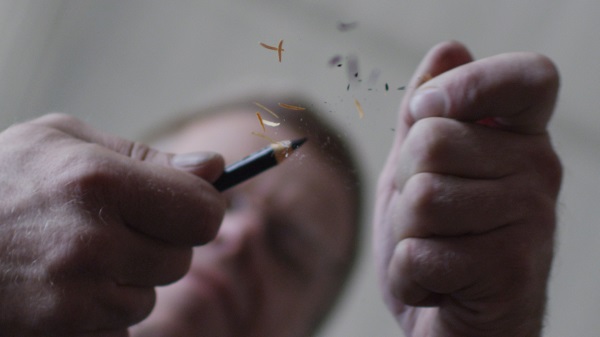
You both are from Ohio. The film was made primarily in Cleveland. I’m also from Ohio, so I may be a bit biased, but it seems like great things come from this state. To be honest, watching your film made me a little homesick. How do you think this area has impacted your creativity and form of expression?
Nick: Totally. I agree. Like Rick Manore says in the film it’s “the great wrong place, and living in the great wrong place requires you to express yourself of the void you are living in” I agree with that 100%. Cleveland has seen some tough times over the years. It’s full of hearty working class people who don’t take no for an answer. I believe the hottest fires make the strongest steel. And Cleveland creates character.
Derek: I think that at the end of the film, William, the guy that owns the gallery, William Busta Gallery, was speaking about artists’ regional cities, and how your art is affected by your environment. It’s true of Cleveland. I think it’s a pretty great place. It’s gritty, but I love the lake, I love Lake Erie. We’re blessed to have that resource here. Water could be a huge issue in the future. We have the largest source of fresh water in the world with the Great Lakes. We need to take care of it. I don’t know, everyone approaches it differently. There are a lot of uniform ways people approach things across the country, but here it’s different. There are a lot of pierogi, kielbasa and sauerkraut, and it’s wonderful. Stuffed cabbage. It’s Slovenian, it’s Croatian, it’s German and Irish and Polish. A lot of those old world ethics, those hard work ethics, from the 1st generation of people that came over here have spilled over into our local culture.
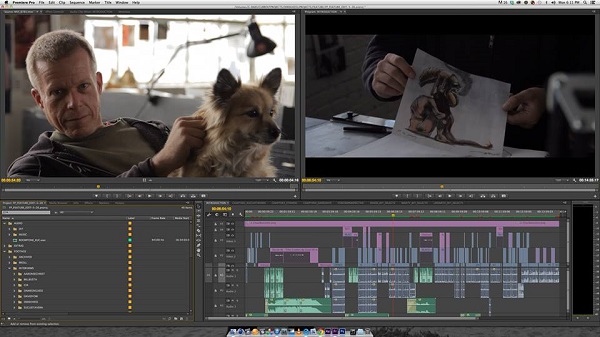
Any upcoming projects you’d like to share? Any plans to pursue more with mental illness awareness?
Nick: Absolutely. I’m working on a few commissions right now. One for a vinyl record plant in Cleveland called Gotta Groove Records. That will release the end of the month. I am working on a piece for the Warrior Angels Foundation that will release on July fourth. That explores the underlying causes for PTSD caused by Traumatic brain injury. Hopefully it will help a lot of people. As far as mental illness goes, I was approached by Project Semicolon to tell their story, and we are working out those details now. Outside of that, I have some irons in the fire for some bigger projects. Pitching a TV show involving food, which I’m really excited about. Can’t say much about it yet, but when I can I will.
Derek: No plans to work more with mental illness awareness, unless somebody wants to talk about it. I was working with a mental health [organization] in Virginia; I did a drawing for them. They showed me what they were going to do with the graphic and it was terrible. But I volunteered to do this. Then they were getting all picky about it. They wanted me to go talk with a bunch of authors, and I’m like I shouldn’t do that, I didn’t write a book. If they wrote a book, they have to be incredibly versed in the subject, and I’m just living it. I hadn’t done any great research or anything like that. So yeah, I declined that. I didn’t want to be the loser up there with three decorated doctors [studying me]. It’s like “please don’t set me up”. But I’m not opposed to it. If people want to talk about it, that’s fine.
I don’t really have any projects lined up. I am going to get a radio show; it’s going to be a lot of fun. We did a screening at Cleveland State, and I’ve been on college radio stations doing promotions throughout the year. I’ve been a guest a lot. I love radio, and I’ve always wanted to do a show. I spoke to the station manager after the screening, I told him my passion about it, and he’s like “Well, our ratings are down, we may try to get you”, a use-my-name type of thing. And I’m like yeah, whatever it takes, give me a radio show [laughs]. So, they’re going to do it. On a college radio show, only the students get to be on there, so they’re making an exception. I think it’s going to be really, really cool. I start training next week. I’m just going to play music I like. I’m going to have random cool people come on, like the weather woman from Channel 3, she doesn’t know it yet though. And my local district detective that used to be a bouncer for my [music] shows, and DJs from other radio shows. We’ll see if I can make it work. I’m worried about all the technical aspects, making sure I get all of that right. I don’t want to blow it.
We are also exploring doing instructional videos… one would be how to draw the hand, how to draw the head, the ankle, the whole body… whatever. They’d be like 10 minute videos. I guess there are bunch out there, I’ve never seem them. Marty [my manager] searched it, and he thinks we should try doing that. Or I should try doing that [laughs]. He’ll do a lot of the work, but I’m the one that has to be on camera. We’ll give it a shot. Fundamentals in drawing aren’t really a priority to artists anymore.
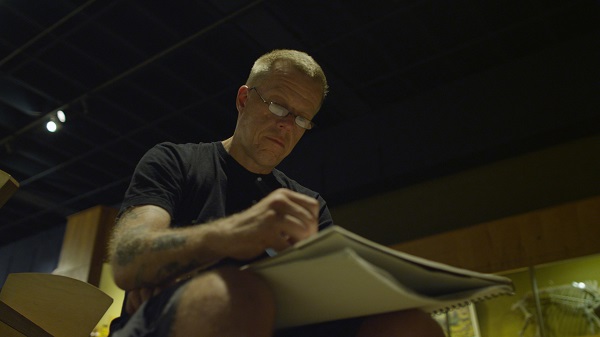
What do you want your viewers to take away from the experience of watching your film?
Nick: The most important thing I want people to feel is inspired. Inspired to become a hero like Derek did. To inspire others with their craft. The movie is a beacon of creativity screaming loudly “You can do this too. There are no excuses.” That’s transcendent of the arts. The film is about defying the odds, and adversity. Chasing your passion. Outside of that I hope people who have mental illness see the film and hear the message (hidden in the subtext) that you can be extraordinary. Channel that “illness” into an advantage.
Derek: Well, I’d like people to have a grasp, or a better grasp, of where I’m coming from. I’ve heard a lot of “I like this piece, but now I really like it [after seeing the film]”, now that they know the story behind it and how it’s produced. So I think that’s great. And for somebody that’s not aware of me, I just hope that aren’t bored [laughs]. For people that like art or are art oriented, I think they will like it. Or at least can find parts to appreciate. It’s good for people to get an idea of where the art is coming from. That’s what I’d like for them to take away from it.
Derek, the film goes over your artistic evolution from your beginning to today. How do you hope to continue to evolve?
Derek: I have a crummy answer for that. I’ve no idea. People say set goals, what are your goals in 5 years, 10 years, what are you going to do? And I’m like “I have no idea”. I’m just kind of doing things. Opportunities present themselves to me, I choose which one to go down, and if I’m fortunate, more opportunities will come. I don’t think like that. I don’t have a 401k, I really don’t have set goals. I just want to be able to continue to express myself and find my higher power and people still appreciate it. I want to continue making a living at this. But yeah, I have no idea what I’ll be doing next year. Hopefully it’ll be something cool.
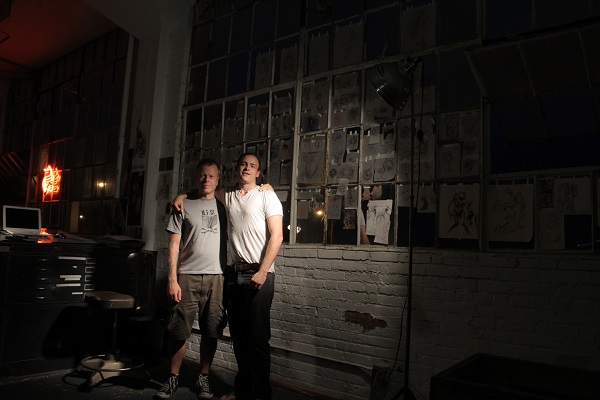
Having spent a lot of time together working on this film, how would you say you two affected each other as a result?
Nick: Derek was a huge inspiration on me. Always has been. His work ethic is almost superhuman and his need to create is a part of his fabric as a person. That was the most inspiring thing. Seeing him draw. His philosophies on art and life mirror that of my own, and seeing his process was the most valuable thing. I now break down the anatomy of my own work (if you will). I’m more critical of the fundamentals all because of Derek.
Derek: Well, let me tell you about Nick. Nick said he was going to be at my place at 8 in the morning, and I’m like “what?!”. He says, “I’ll be there at 8 and we’re going to get started”. Nick is very gung-ho. I said all right. So I get up, it’s 7:30 am, I’m like I’ve got another half hour, I’ll drink some coffee before we get started. It’s 7:30, there’s a knock on my door. Nick. Never failed. Whenever he said he was going to be at my place, he was there a half hour early. Because he was so pumped, and ready to go, and so passionate about it, he just wanted to come here and do it. I’m like “C’mon, Nick, we’ve got all day”, let me drink my coffee, Christ. I think we influenced each other positively. He’s a good dude. We have similar interests; we have similar tastes in music. Music bonds people, He listens to a lot of the same metal stuff that I am into. So there was a like mind right there, a common thread. Yeah, I’d hang out with Nick whether he did the movie or not.
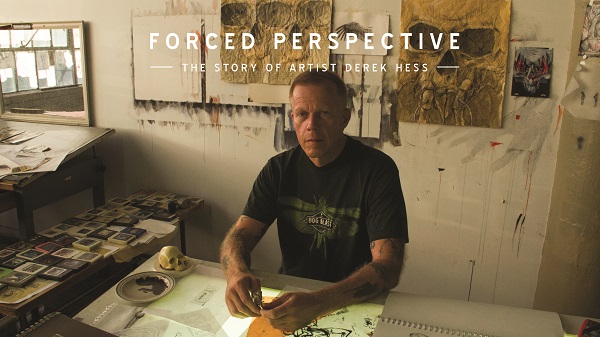
Nick, during the film, you ask Hess fans and collectors how Derek’s art has affected them (brilliant addition to the film, by the way). Yourself being a long time Hess fan, how has his work impacted you?
Nick: When I was 14 and an angst-y metal kid, I used to go to Derek Hess shows. The Strhess fests in the film were a part of my youth. I too got in a lot of trouble when I was a kid. Derek’s art always spoke to me I think because of that. I also can draw quite well, and have been doing so since I was a kid. Derek’s art always inspired me to simplify my line work and anatomy, and long before I met him was pushing me to be better.
Derek, you’re a huge music fan and it is obviously a huge part of your art and life. Any more upcoming with your Strhess Fest music festival?
Derek: No, I’m doing those any more. That’s a young man’s sport [laughs]. It’s a hell of a lot of work. There was a time and place for that, but it has run it’s course. It’s nice not doing that because now I can really enjoy the music and not be worried about guaranteeing agents, promoters, ticket sales, bands…there are a lot of rock stars out there. Just enjoying the bands anymore.
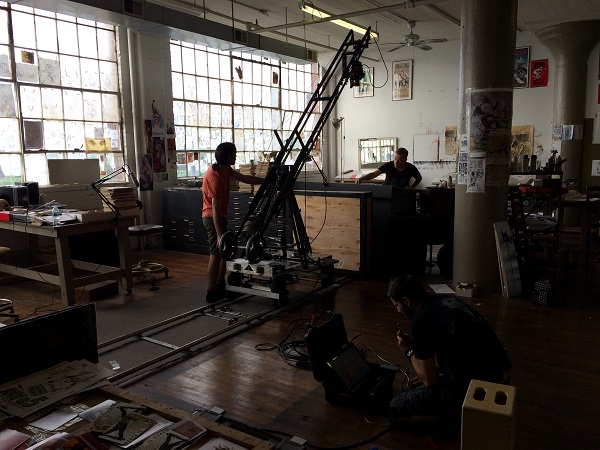
Nick, we see the end result of your hard work, watching the film on screen. What we don’t see or necessarily think about is what it took to create the film. Not being experienced with filmmaking, I would love to learn a little more about how you made Forced Perspective. Give us the nitty gritty.
Nick: Wow, that’s a tough one. Outside of the tremendous amount of work it takes to make a film like this, and the talented people I was lucky enough to work with, the process is what makes it special. It was a small crew, and we kept things intimate so we didn’t spook Derek. That allowed us to keep it more conversational and natural. The most fascinating part to me was piecing it together in the edit. I had Derek’s timeline down, but I didn’t want this to be a biography film. That’s not exciting to me. So I was reading a lot of Greek myth at the time, and about halfway through the edit it clicked. Derek is a super hero. Literally. He was born with an extraordinary ability, cultivated by a mentor. He was pushed out into the great unknown, and he used his powers to face his adversities, and in turn, inspire others to greatness. This is a universal story, and that was important to me to make the film an archetype. Accessible and relatable even if you don’t know who Derek Hess is.
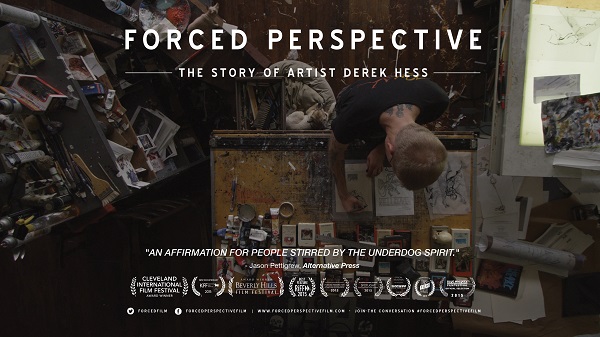
Derek, in the film, you mention that you’re not religious, but you talk about tapping into your “source”. You give the example that God is a source. What is your source?
Derek: I think a source is a source. I think it’s everybody. I think it has a lot to do with positive energy. I think the source is what we all try to connect to. We all do it differently. Every religion has a ritual. But I think everyone is trying to connect to the same place. Wars over religion…obviously that’s silly because you’re all fighting over the same damn thing. It’s not good to be warring about anything, really. It’s not good as far as energy goes. I think my source is my higher power. I believe that it’s there, I think I’ve touched on it a couple times. I meditate with a guy, a normal guy who paints houses during the day. He told me that this is his last incarnation, and he’s just here to elevate others to the force, to the Divine is what he called it, he mediates with everyone and doesn’t charge. I thought that was cool. I’ve sat with him a lot. During deep meditation, I’ve touched on my source [my higher self].
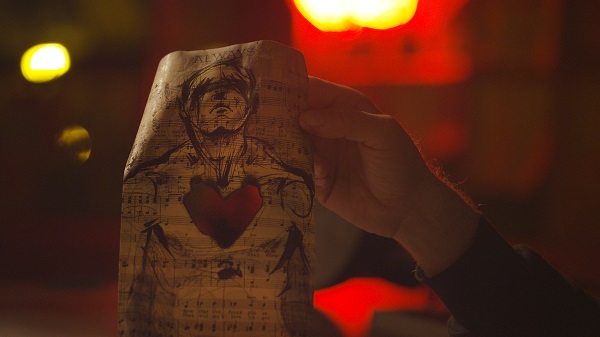
For the sake of those newly introduced to Derek Hess, let’s pretend that I haven’t been a fan my whole life. The film is now out for preorder, with some interesting packages such as a limited edition print and a book. Tell me why I need to add this documentary to my collection, and describe the fun add-ons.
Nick: Well, if you are a fan you are in luck. We decided to make a 200-page art book mirroring the chapters in the film with art from each era of his life to accompany it. From his college years, through the Euclid tavern posters, into Strhess and post hardcore, all the way into today. Each chapter has insight from Derek and some art you have never seen before. I also wrote a whole chapter about production and we get a behind the scenes look into what made the film work. That book comes with a Blu-ray extra feature disc with 90 minutes of additional content… deleted scenes, extra features etc. It’s pretty great, and I made it because I myself selfishly want one for my own collection.
Derek: If you buy the film book, you get to see all the outtakes that didn’t make the film. There’s more comic book talk. There are different groupings for the book sales. We are doing a limited edition silkscreen print of 100, you can get the movie poster that both Nick and I are going to sign. You can get a Blu-ray DVD, and the outtakes DVD. It’s quality stuff. We’ve been at it so long, we don’t cut corners. The book is nice; there is a lot more artwork in the book than there was in the movie. We made sure we got as much art in there as possible.



